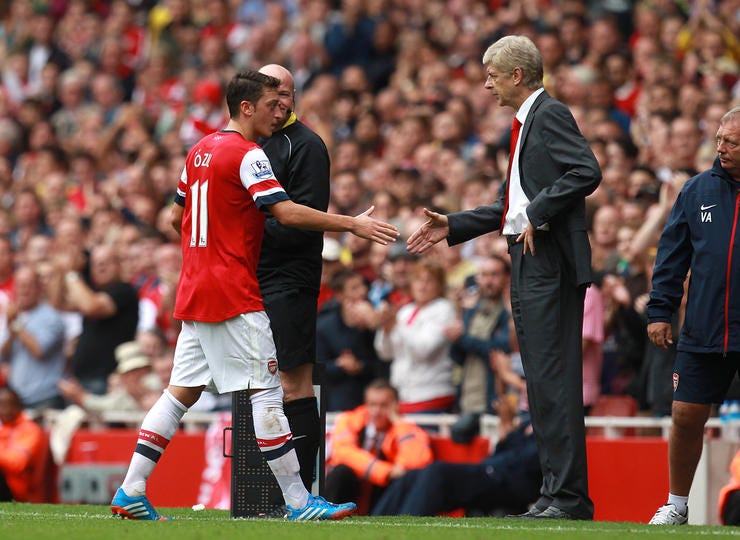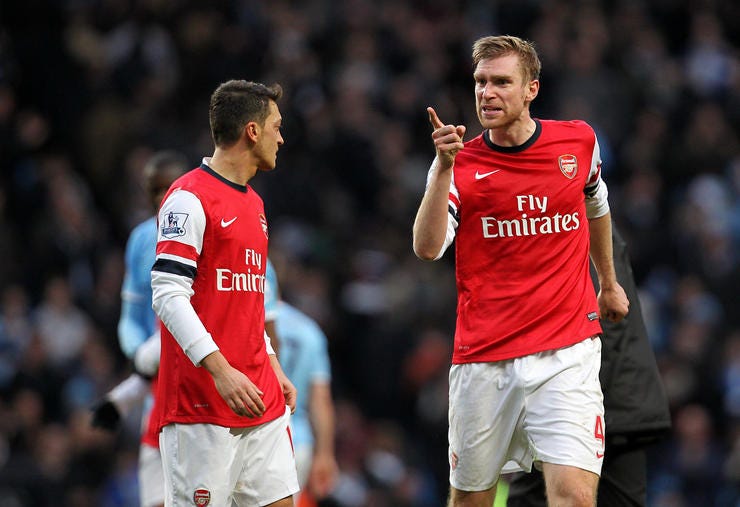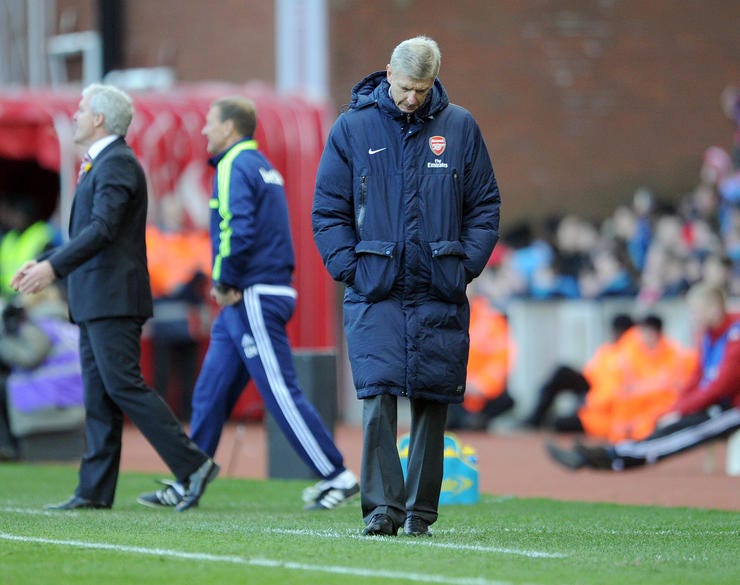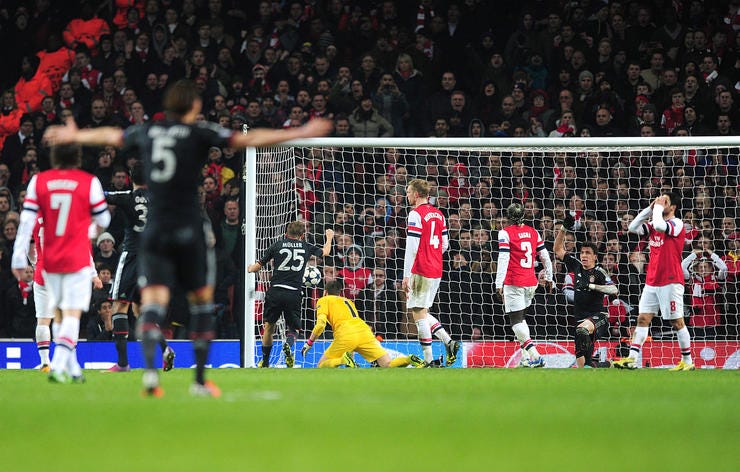Arsenal: Worse than last year — so can they turn it round?
Spring is in the air, and Arsenal are in chaos: lacking fitness and form, heading out of Europe and slipping out of the title race. And they’re doing worse than last season, with hard games to come…
Here’s a name for Arsenal fans: Jean-Baptiste Alphonse Karr. Some might guess he’s a talented French teenager getting rave notices in the Academy — discovered in the Dordogne, excellent first touch, converted to an attacking full-back. In fact, he’s a long-dead beardy satirist who coined the phrase “plus ça change, plus c’est la même chose”: the more things change, the more they stay the same.
Applied with epigrammatic regularity and a heavy sigh, Karr’s phrase fits Arsenal’s season like an ergonomic glove. A campaign which started spectacularly and continued impressively for long enough to create genuine belief among fans and critics is threatening to wobble off the rails again… and a dig into the statistics shows that the results have been worse than last season.
Change for the better
Change came in late summer and autumn. After an opening-day home defeat to Aston Villa which featured home fans waving “Spend spend spend” placards at Arsene Wenger, he did so with a transfer of such magnitude that it seemed to announce a new Emirates era.
Wenger has never been one to sacrifice his beliefs for the baying masses, but the clearing of Arsenal’s stadium debt gave him a genuine opportunity to stop shopping in the bargain bins of Europe’s lower divisions and les academies Francaise and buy the finished article. Although frustrated in his attempts to buy Gonzalo Higuain and Luis Suarez — pause to ponder the possibilities lost in that last luckless bid — on September 2 he finally got his high-ticket item.

And what a purchase Mesut Ozil was. Firstly, the finances: at £42.5 million, the second biggest outlay in British football history almost trebled Arsenal’s previous record expenditure (£15m on Andrey Arshavin), while Ozil’s £140,000-per-week five-year contract also demolished their wage structure: no other player had even hit six figures, although Aaron Ramsey’s recently signed new deal does.
Not that Arsenal were throwing money at an ageing desperado: 24 when they bought him, Ozil had provided more assists over the last five seasons than anyone else in Europe’s top five leagues. The German hit the ground running: on his debut at Sunderland, his first touch brilliantly controlled a high pass over his shoulder, his second touch set up a goal for Olivier Giroud. With Ozil and Ramsey in fiery harness, Arsenal rocketed to the top of the league by mid-September and stayed there for most of the next five months.
Change for the worse
Even so, there remained a nagging unease that Arsenal were still short in the crucial games. Defeats to Borussia Dortmund and Napoli meant they needed goal difference to get through the Champions League groups — for the 14th successive time: plus ça change — and the first time they faced someone domestically from last season’s top four they lost 1–0 at Manchester United.
Worse followed on their next trip to Manchester: City put six past them, and Ozil was castigated by compatriot Per Mertesacker for not acknowledging the travelling fans. That error of etiquette was of less concern to Gooners than that their star man had again been quiet on the big stage, creating fewer chances than Bacary Sagna. The suspicion grew that Ozil embodied the team’s inability to compete against the best teams.

Then came February, and the run of games that many expected to define Arsenal’s season. A 5–1 annihilation at Anfield toppled them from the Premier League summit, fading champions Manchester United kept it goalless at the Emirates and a revenge FA Cup win over Liverpool was soon overshadowed when Bayern came to town.
Having weathered Arsenal’s first-half enthusiasm, Pep Guardiola’s side scored early in the second and tortured their hosts. Ozil, having had his early penalty saved, drifted to the periphery and was lucky to avoid substitution; his team-mates turned to cowed schoolkids, desperately giving him the ball and expecting brilliance. For the return against his debut opponents Sunderland, the exhausted German was rested to the stands; for the annual struggle at Stoke, Ozil was an early but ineffective substitute… and Arsenal lost again.
Regression to the mean
The loss at the Britannia was hardly unexpected but statistically notable. For a start, it dropped them to third place behind resurgent Liverpool and, four points clear, ruthless Chelsea. And it also meant that they’re doing demonstrably worse this season than last season.
True, after 28 games last term Arsenal were fifth, a monstrous 24 points behind champions-elect Manchester United and five off the Champions League qualifiers’ pace, having had yet another early-spring wobble by losing three games in four. And they only had 47 points on the board, 12 fewer than this season.

But a more detailed analysis of the two seasons’ fixtures reveals that Arsenal did better last season against the same teams. Replacing last season’s three relegated teams (against whom the Gunners had a 100% record) with this term’s three newbies (again, Arsenal have won 5 out of 5 with a Hull trip still to come) shows that last season, against the same opponents, they gained 60 points. That Stoke win, symptomatic for many of the Gunners’ fragility, puts them behind their own pace of last term.
The flip side of that is that Arsenal have some big games to go. They still have to visit Chelsea, Tottenham and Everton, and to welcome Manchester City. And again, they are doing worse against the other six teams at the top, thanks to those losses at City and Liverpool, where last season they got four points and this season they got humiliated. The Gunners will have to considerably up their game in those tough fixtures if they are to avoid what mathletes call regression to the mean: in their case, a return to the distant third and fourth-place finishes that have characterised the last eight seasons.
March on to May
Wenger wasn’t blind to the significance of the Stoke defeat. “This is a massive setback. To win a title, when you are expected to perform you have to perform, it’s as simple as that. It is not slightly worrying, this is a big worry to lose a game like this.”
Even so, the Frenchman vigorously denied that Arsenal’s wobble is perennial. “Look at our results at the crucial point in the season and you would be surprised,” he insisted. “Somebody says something that is not checked and everyone repeats it and it becomes an opinion, even if the facts don’t show it. Our end of season has always been very strong.”
The trouble is that Arsenal aren’t yet at the end of the season, even if the Champions League trip is likely to end in Munich on Tuesday. As The Independent’s Jack de Menezes researched, since 2008 the Gunners have won 54.8% of their matches in February and March, triumphing in 40 of their 73 fixtures — but losing 17 times. “A 54.8% win ratio isn’t going to do you any favours in securing silverware at the business end of the season,” writes Menezes, “and with a number of those defeats coming in cup competition, it does show a tendency to slip up when it matters most.”

Wenger is undoubtedly right that Arsenal have frequently finished strongly: The Guardian’s Sean Ingle notes the Gunners’ points-per-game average was higher from March to May than from August to February on seven occasions out of nine between 1998 and 2006, “when the trophies flowed as easily as the football”. But it is a long, potless time since that last FA Cup win in 2005.
They finished well last season, hoovering up 26 of a possible 30 points from mid-March onwards to snaffle fourth place — but despite Wenger’s claim that Champions League qualification is more important than a domestic cup, it felt more like a consolation prize than a cause for celebration. And that was after coming from behind to pip Spurs, like grabbing a 2–2 draw late on from two goals down: after leading the way for half the season, this would feel quite the opposite.
The future
It’s not all doom. Arsenal’s strong finishing run last season followed on immediately from the valiant Champions League exit in Munich; although they won’t be given much chance of turning round a 2–0 deficit in Bavaria, a spirited showing could lift the mood for a focused effort in the league. Before that, this weekend they host Everton in the sixth round of the FA Cup — a much less demanding and distracting competition they stand a decent chance of winning, considering that of the teams left they should only really fear Manchester City.
But there’s the rub: should Arsenal fear Manchester City? Speaking to Gooners, it’s hard to avoid the thought that the big games are feared rather than relished, on the stands and the pitch. That’s the problem Wenger needs to address: there’s no point parsing other teams’ fixtures — noting that Liverpool are yet to host Chelsea and Manchester City, for example — if they’re to flunk their own tests.
Besides the Emirates clash with Pellegrini’s potent but permeable side on March 29, Arsenal have three other fixtures remaining against top-seven sides — all away. The key trips to Chelsea, Tottenham and Everton aren’t trials to endure but chances to best their rivals — and, crucially, to improve on last season.
In 2012/13 those four fixtures yielded just one point (a 1–1 draw at Goodison) but Arsenal were far from outclassed in 2–1 defeats at Stamford Bridge and White Hart Lane, losing the latter to two carbon-copy goals in three minutes and pushing Chelsea hard after two goals which had Wenger questioning the officials.
Turning this kind of defeat into victory would not only improve on last season but also thwart rivals to their own benefit. Furthermore it’s worth noting that Arsenal — whose lightning counter-attacks can sucker-punch home teams — have the division’s second-best away record (after Spurs). They’ll have to do it without Jack Wilshere, injured on England duty, but it’s not like they lack midfielders: they paid £42m for one not long since, and he’s just recharged his batteries.
Moreover, they have to start thinking they can win the big games rather than fearing all will be lost. Wenger’s men need to believe in themselves and stand up to others — or things will never change for good.
Originally published by FourFourTwo on March 7, 2014.





